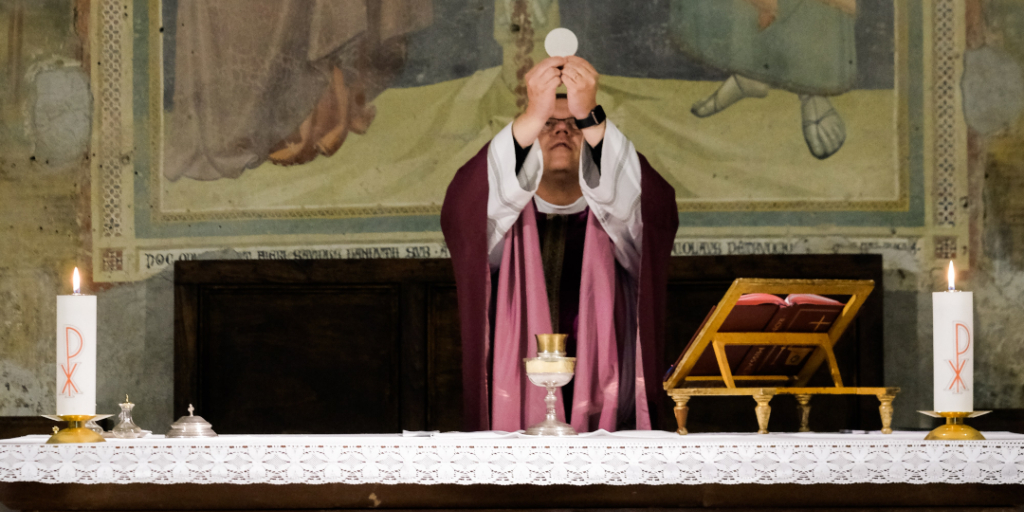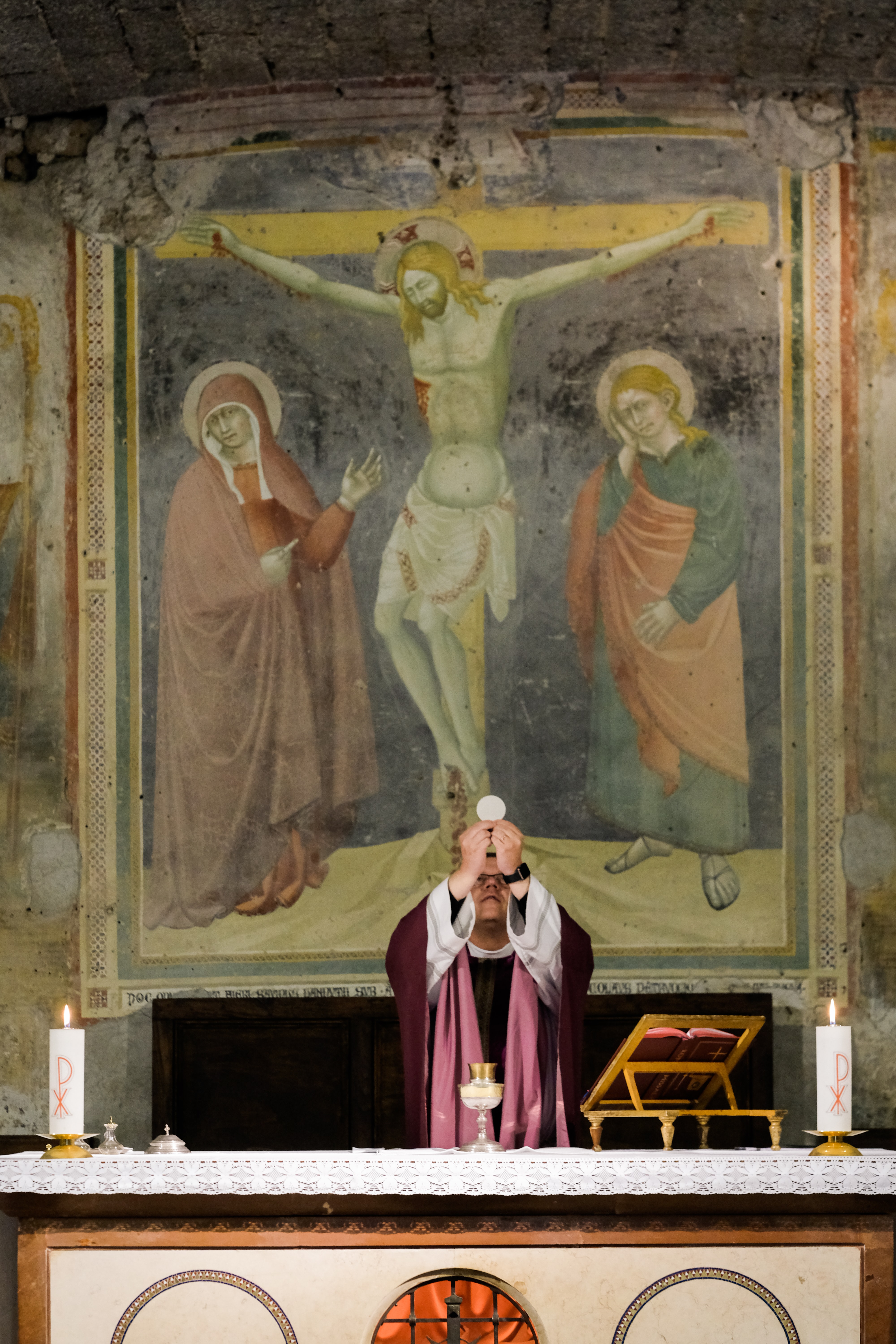
Flávia Ghelardi reviews what happens at the moment in the Mass when bread and wine become the Body, Blood, Soul, and Divinity of Christ.
Flávia Ghelardi writes from Brazil in English and Portuguese. Vá para a versão em português.
In these times of pandemic, when many of us have been deprived of participating in the Holy Mass and others, unfortunately, have become accustomed to the "virtual Mass," I would like to remind you what really happens at this very special moment, according to the doctrine of the Church.
The Holy Mass can be divided into two major parts: the Liturgy of the Word and the Liturgy of the Eucharist, having as its apex the transubstantiation, when the bread becomes the Body and the wine becomes the Blood of Jesus Christ and where we are invited to commune with this body, blood, soul and divinity of Jesus, becoming one flesh with Him, our divine Savior.
I would like to focus our reflection on the Eucharistic liturgy. As soon as it begins and the priest invites us to lift up our hearts, the so-called "communion of saints" begins, that is, the union of the Militant Church (we who are still here on this earth), the Penitent Church (the souls in Purgatory) and the Triumphant Church (the souls, the saints who are already in Heaven).
When we answer "we lift them up to the Lord," it is as if Heaven opens and we transport ourselves there, and then join the angels and saints to praise God, singing or saying: Holy, holy, holy ...
Immediately after, the priest begins the Eucharistic prayer, asking the Father to sanctify the offerings of bread and wine that are on the altar and that will be transformed into the Body and Blood of Jesus Christ, with the power of the Holy Spirit. At this moment, upon hearing the bell, the faithful kneel down and are transported back in time to the place and moment of the Last Supper. Although our senses don't perceive it, this true "time travel" happens and, from that moment on, the priest is no longer the priest, but Jesus himself, and all the participants are really present in that sacred moment.
When Jesus, using the voice of the priest, says "This is my body," the host is really transformed into the body of Jesus and then we are no longer at the Last Supper, but at the foot of the Cross on Calvary. At that moment, we are witnesses to the sacrifice of infinite love that Jesus made for each of us by dying on the Cross.
If we pay attention to the gestures of the priest/Jesus we can capture a little more of the infinite beauty of that moment. Just as Jesus, on the cross, first bowed his head and then, surrendered his spirit, giving his last breath (John 18:1), the priest first bows over the host and then pronounces the words of consecration, the priest's breath being the same breath of Jesus, transforming the host into Body and the wine into Blood.
It is important to note that on the cross, the sacrifice was consummated by the blood being separated from the body of Christ physically, when the soldier used his spear and opened a wound in Jesus' side, from which blood and water gushed out. In the Holy Mass, the sacrifice is consummated by the blood being separated from the body of Christ sacramentally, so they are consecrated separately, first the body, then the blood.
Heaven, earth and purgatory at that moment are united, witnessing this gesture of incomparable love that redeemed all mankind. The sacrifice of the Son, to the Father, with the presence of the Holy Spirit, the Trinity pouring torrents of love over all humanity. It is such a sublime moment, that if we could capture something with our senses, as some saints could, we would not be able to stop crying.
The liturgy continues with prayers for the faithful present, for the faithful deceased, for the Holy Church and its ministers, and that all may one day participate in eternal life with all the angels and saints who are still there, praising and glorifying the Holy Trinity.
Then comes the most awaited moment, when each one of us is invited to participate in this sacrifice of love, to become intimately united with Jesus, becoming one body with Him. It is an unfathomable mystery how God Himself wanted to unite Himself in this way with us, His sinful creatures. He gave Himself entirely to us, without reserve, and the best we can do to repay such a grace is to give ourselves entirely to Him.
Such a sublime moment should be followed by a deep thanksgiving on the part of each one of us. For about the next 15 minutes after we take Communion, Jesus is physically there with us, so we should make the most of this presence, giving ourselves to him, giving thanks for this moment and making our requests, especially to be faithful and loving children.

Let's see what some saints tell us about the Holy Mass:
"Know, O Christian, that more is deserved in listening devoutly to a single Mass than to distribute all one's riches to the poor and to wander the whole earth" (St. Bernard).
"Our Lord grants us everything we ask him for at Holy Mass: and what is more valuable is that he gives us still what we have not even thought of asking him for and which, nevertheless, is necessary for us" (St. Jerome).
"If we knew the value of the Holy Sacrifice of the Mass what zeal we would not have in attending it!" (St. John Vianney).
The Marvelous Value of the Holy Mass
At the hour of death, the Masses you have attended will be your greatest consolation. Every Mass implores your forgiveness from divine justice. In every Mass you can lessen the temporal penalty due to your sins, and lessen it more or less according to your fervor. By attending Mass with devotion, you do the greatest honor to the holy humanity of Jesus Christ. He takes pity on many of your negligences and omissions. He forgives you for unconfessed venial sins that you have repented of. He diminishes Satan's hold on you. Suffrage the souls in purgatory the best way possible. The Mass preserves you from many dangers and misfortunes that would befall you. Every Mass diminishes your purgatory. Every Mass achieves a greater degree of glory for you in heaven. At Mass, you receive the priest's blessing, which Our Lord ratifies in heaven. You are blessed in your business and personal interests. (from The 15 Magnificent Prayers of Saint Bridget of Sweden)
After reflecting on the value of the Holy Mass, what more important commitment can you have in your day? Let's make an effort to participate as often as possible in Holy Mass, remembering that the so-called "virtual Mass" is not the same as the physical Mass, being only a moment of prayer and not having the power to transport us to Calvary, as it happens when we are physically present next to the priest.
A SANTA MISSA: UMA MÁQUINA DO TEMPO
Nestes tempos de pandemia, onde muitos de nós fomos privados de participar da Santa Missa e outros, infelizmente, já se acostumaram com a “missa virtual”, gostaria de lembrar o que realmente acontece nesse momento tão especial, de acordo com a doutrina da Igreja.
A Santa Missa pode ser dividida em duas grandes partes: a liturgia da palavra e a liturgia eucarística, tendo como seu ápice a transubstanciação, quando o pão se torna corpo e o vinho se torna o sangue de Jesus Cristo e onde somos convidados a comungarmos desse corpo, sangue alma e divindade de Jesus, tornando-nos uma só carne com ele, nosso divino Salvador.
Gostaria de focar nossa reflexão sobre a liturgia eucarística. Assim que que ela começa e o sacerdote nos convida a elevar nossos corações, tem início à chamada “comunhão dos santos”, ou seja, a união da Igreja Militante (nós que estamos ainda aqui nesta terra), a Igreja Padecente (as almas que estão no Purgatório) e a Igreja Triunfante (as almas, os santos que já estão no Céu).
Quando respondemos: “o nosso coração está em Deus”, é como se o Céu se abrisse e nós nos transportássemos até lá, para depois nos unir aos anjos e santos para louvar a Deus, cantando ou dizendo: Santo, santo, santo...
Logo depois, o sacerdote inicia a oração eucarística, pedindo ao Pai, que santifique as oferendas do pão e do vinho que estão no altar e que irão se transformar no Corpo e no Sangue de Jesus Cristo, com a força do Espírito Santo. Nesse momento, ao ouvir a sineta, os fiéis se ajoelham e são transportados no tempo, para o local e o momento da Última Ceia. Apesar de nossos sentidos não perceberem, acontece essa verdadeira “viagem no tempo” e, a partir daquele momento, o sacerdote já não é mais ele, mas sim o próprio Jesus e todos os participantes estão realmente presentes naquele momento sagrado.
Quando Jesus, utilizando-se da voz do sacerdote, diz “Isto é o meu Corpo”, a hóstia se transforma realmente no Corpo de Jesus e então já não estamos mais na Última Ceia, mas sim aos pés da Cruz no Calvário. Nesse momento, somos testemunhas do sacrifício de amor infinito que Jesus fez por cada um de nós, morrendo na Cruz.
Se prestarmos atenção nos gestos do sacerdote/Jesus poderemos captar um pouco mais da beleza infinita desse momento. Da mesma forma que Jesus, na cruz, primeiro inclinou a cabeça e depois, entregou seu espírito, dando seu último suspiro (Jo 18,1), o sacerdote primeiro se inclina sobre a hóstia e depois pronuncia as palavras da consagração, sendo o suspiro do sacerdote o mesmo suspiro de Jesus, transformando a hóstia em Corpo e o vinho em Sangue.
É importante salientar que na cruz, o sacrifício foi consumado pelo sangue sendo separado do corpo de Cristo fisicamente, quando o soldado usou a lança e abriu uma chaga no lado de Jesus, de onde jorraram sangue e água. Na Santa Missa, o sacrifício é consumado pelo sangue sendo separado do corpo de Cristo sacramentalmente, por isso são consagrados separadamente, primeiro o corpo, depois o sangue.
O Céu, a terra e o purgatório nesse momento estão unidos, testemunhando esse gesto de amor incomparável que redimiu toda a humanidade. O sacrifício do Filho, ao Pai, com a presença do Espírito Santo, a Trindade derramando torrentes de amor sobre toda a humanidade. É um momento tão sublime, que se pudéssemos captar algo com nossos sentidos, como alguns santos puderam, não poderíamos parar de chorar.
A liturgia segue com as orações pelos fiéis presentes, pelos fiéis defuntos, pela Santa Igreja e seus ministros e para que todos, possam, um dia, participar da vida eterna com todos os anjos e santos que continuam ainda ali presentes, louvando e glorificando a Santíssima Trindade.
Chega então o momento mais esperado, quando cada um de nós é convidado a participarmos desse sacrifício de amor, a nos unirmos intimamente com Jesus, tornando-nos um só corpo com Ele. É um mistério insondável como o próprio Deus quis se unir dessa forma conosco, suas criaturas pecadoras. Ele se deu inteiramente a nós, sem reserva, e o melhor que podemos fazer para retribuir tamanha graça, é nos entregarmos inteiramente a Ele.
Esse momento tão sublime deve ser seguido de uma profunda ação de graças por parte de cada um de nós. Aproximadamente nos próximos 15 minutos depois que comungamos, Jesus está ali fisicamente conosco, então devemos aproveitar ao máximo essa presença, nos entregando a ele, agradecendo por esse momento e fazendo nossos pedidos, principalmente o de sermos filhos fiéis e amorosos.
Vejamos o que nos falam alguns santos sobre a Santa Missa:
“Fica sabendo, ó cristão, que mais se merece em ouvir devotamente uma só Missa do que distribuir todas as riquezas aos pobres e a peregrinar toda a terra” S. Bernardo
“Nosso Senhor nos concede tudo o que lhe pedimos na Santa Missa: e o que mais vale é que nos dá ainda o que nem sequer cogitamos pedir-lhe e que, entretanto, nos é necessário” S. Jerônimo
“Se conhecêssemos o valor do Santo Sacrifício da Missa que zelo não teríamos em assistir a ela!” S. Cura D´Ars
O Maravilhoso Valor da Santa Missa
“Na hora da morte, as Missas que houveres assistido serão a tua maior consolação. Toda Missa implora o teu perdão junto da justiça divina. Em toda Missa, podes diminuir a pena temporal devida aos teus pecados, e diminuí-la mais ou menos consoante o teu fervor. Assistindo com devoção à Missa, prestas a maior das honras à santa humanidade de Jesus Cristo. Ele compadece-se de muitas das tuas negligências e omissões. Perdoa-te os pecados veniais não confessados, dos quais, porém, te arrependeste. Diminui o império de Satanás sobre ti. Sufraga as almas do purgatório da melhor maneira possível. A missa preserva-te de muitos perigos e desgraças que te abateriam. Toda Missa diminui o teu purgatório. Toda Missa alcança-te um grau de glória maior no céu. Na Missa, recebes a bênção do sacerdote, a qual Nosso Senhor ratifica no céu. És abençoado em teus negócios e interesses pessoais. (livro As 15 Orações de Santa Brigida)
Depois de refletir sobre o valor da Santa Missa, que compromisso mais importante do que esse você pode ter no seu dia? Vamos nos esforçar para participarmos o mais frequente possível da Santa Missa, lembrando que a chamada “missa virtual” não se equipara à missa presencial, sendo apenas um momento de oração e não tendo o poder de nos transportar ao Calvário, como acontece quando estamos fisicamente presentes junto ao sacerdote.
Copyright 2021 Flávia Ghelardi
Image: Josh Applegate (2019), Unsplash
About the Author

Flávia Ghelardi
Flávia Ghelardi is the mom of four, a former lawyer already "promoted" to full time mom. Flávia published her first book FORTALECENDO SUA FAMÍLIA and is a member of Schoenstatt´s Apostolic Movement. Flávia loves to speak about motherhood and the important role of women, as desired by God, for our society. She blogs at www.fortalecendosuafamilia.blogspot.com.


.png?width=1806&height=731&name=CatholicMom_hcfm_logo1_pos_871c_2728c%20(002).png)
Comments